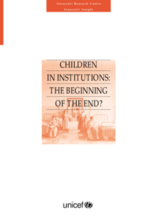In recent years, countries in Latin America have engaged in a critical debate on the institutionalization of children and adolescents as a response to family problems, disabilities, financial problems and types of conduct perceived as a threat to society.
The new paradigm established by the Convention on the Rights of the Child with regard to the relations between children and families, society and the state, has shifted the focus of the debate on institutionalization from technical and systems management issues and the effect of institutionalization on children, to a policy and strategic outlook aimed at generating opportunities for human development to all.
This publication provides an account of historical processes in Spain and Italy which have led to a transformation of social child protection policies and an abandonment of the most widely-used mechanism of social exclusion, namely institutionalization.
We believe that it is extremely useful to investigate the underlying factors which made it possible to implement these processes with a view to shape policies and programmes which promote the social inclusion of children in the Latin American setting.
©UNICEF

